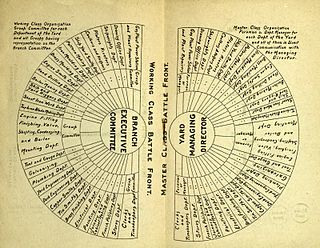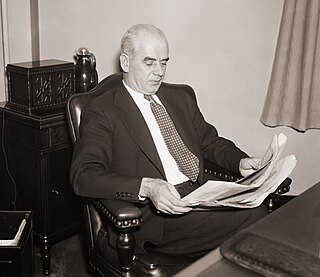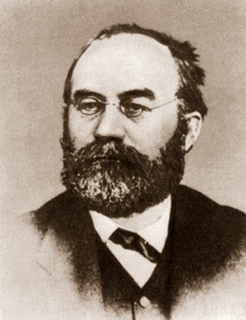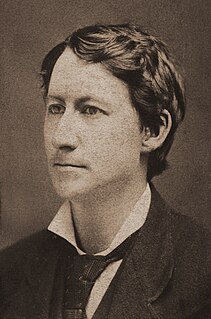| Part of a series on |
| Organized labor |
|---|
 |
Academic disciplines |
The International Labor Union was a trade union in the northeastern United States from 1878-1887.
The ILU was founded by members of the Workingmen's Party of the United States who were upset with the parties turn toward political action after the Newark convention of December, 1877. Some members wanted to concentrate on the economic organization of the working class and split from the renamed Socialistic Labor Party to found the International Labor Union in 1878. Members of the provisional committee of the new organization included Ira Steward, George Gunton, Albert Parsons, Friedrich Adolph Sorge, Otto Weydemeyer, J. P. McDonnell, George McNeill, Carl Speyer and George Schilling. It held its first congress in Paterson, New Jersey in December 1878. [1]
The Workingmen's Party of the United States (WPUS), established in 1876, was one of the first Marxist-influenced political parties in the United States. It is remembered as the forerunner of the Socialist Labor Party of America.
Ira Steward (1831–1883) was a key figure in labor movement in the United States during the late 19th century, and a major advocate for an Eight-hour work day.
George Gunton (1845–1919) was an influential figure in the labor movement of the United States around the turn of the 20th century and was an avid supporter of industrial combinations, or 'trusts'. He was a close colleague of Ira Steward, and upon Steward's death in 1883 he agreed to complete and prepare for publication a book that Steward had been writing. Gunton found only notes, not a nearly complete book. Deciding the notes were not sufficient for editing, Gunton discarded them, instead building on the ideas of his colleague to formulate his own book on the labor movement, "Wealth and Progress", which was published in 1887, followed by "Principles of Social Economics" in 1891. He founded a school, the Institute of Social Economics, in 1891, with the aim of educating the masses in the path of responsible citizenship.
The outlook and goals of the organization were broad. The ILUs program represented an amalgam of the eight-hour philosophy that Steward had been propagandizing, and the industrial unionism of McDonnell and Sorge. Both saw the wages system as a despotism. Immediate demands included reduction of hours, state and local labor bureaus, workplace inspection and prohibition of child labor. [2] Reflecting the industrial unionist aspect of the organization were its goals to organized the unskilled and unorganized, to affiliate already existing unions with itself and to create a national, then international centralized union of all workers. [3]

Industrial unionism is a labour union organizing method through which all workers in the same industry are organized into the same union—regardless of skill or trade—thus giving workers in one industry, or in all industries, more leverage in bargaining and in strike situations. Advocates of industrial unionism value its contributions to building unity and solidarity, many suggesting the slogans, "an injury to one is an injury to all" and "the longer the picket line, the shorter the strike."
In practice its organizing efforts were largely concentrated among textile workers in New Jersey, New York and Massachusetts. It had 700 members in July 1878. After leading a textile strike in Paterson, and organizing efforts in Fall River, Massachusetts, membership had grown to a reported 8,000. [4] Afterwards the organization rapidly shrank to an estimated 15,000 in eight branches by February 1880, and a single branch, Hoboken, the next year. The organization was dissolved when the leader of the Hoboken branch, Sorge, moved to Rochester, New York in 1887. [5]

Hoboken is a city in Hudson County, New Jersey, United States. As of the 2010 United States Census, the city's population was 50,005, having grown by 11,428 (+29.6%) from 38,577 counted in the 2000 Census, which had in turn increased by 5,180 (+15.5%) from the 33,397 in the 1990 Census. Hoboken is part of the New York metropolitan area and is the site of Hoboken Terminal, a major transportation hub for the tri-state region.











